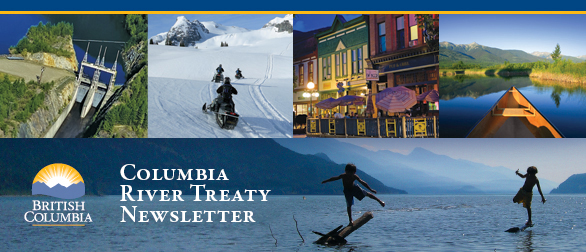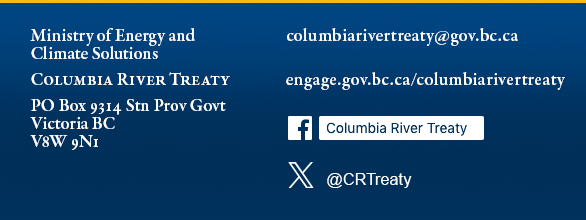Columbia River Treaty
Edition: February 2022

Columbia Basin Regional Advisory Committee expands its Indigenous learning
Feb 14, 2022
Input from Basin Indigenous Nations, residents and local governments is integral to the Columbia River Treaty modernization process. It guides the Canadian negotiating team’s discussions about the future of the Treaty. One of the key groups the Province engages with is the Columbia Basin Regional Advisory Committee, commonly known as CBRAC.
Formed in 2014, CBRAC is a diverse, multi-interest advisory body representing a broad range of perspectives, interests and geography that helps inform potential improvements to the Treaty and Columbia Basin hydroelectric operations. As Canada seeks to negotiate a modernized Treaty with the U.S., CBRAC must understand the main issues at play in order to provide valuable input. A critical part of this is understanding Indigenous Nations’ interests as they relate to the Treaty, as well as their role in the modernization process and future decision making.
Over the years, CBRAC has participated in substantial training and discussions on hydroelectric operations, ecosystem health, Treaty impacts and benefits, and the wide range of Treaty-related community interests. In addition, CBRAC receives updates after each round of Canada-U.S. negotiations from members of the Canadian negotiating delegation. Indigenous perspectives have been woven into many of these conversations, though to fully understand the root of Nations’ interests, deeper education is needed.
As a first step, CBRAC held a webinar last November focused on B.C.’s Declaration on the Rights of Indigenous Peoples Act (Declaration Act)[1]. The session aimed to broaden CBRAC’s foundational understanding of the context in which the Province and Indigenous Governments operate, the B.C. Government’s overarching commitments to reconciliation, the Declaration Act itself and corresponding Action Plan.
The presenter, Regional Director of East Kootenays with the Ministry of Indigenous Relations and Reconciliation, highlighted recent milestones towards reconciliation in B.C. and Canada, and recognized the increasing awareness amongst Canadians about Indigenous history, culture, and values. He also acknowledged the ongoing impacts colonization has had on Indigenous peoples and emphasized that true and lasting reconciliation will take generations.
Representatives from the Ktunaxa and Secwepemc Nations provided their perspectives, in particular on how they see B.C. and Canada’s commitments to reconciliation reflected in the Treaty process. They described how the relationship between Canada, B.C. and the Columbia Basin Indigenous Nations has evolved over time, reaching a positive point where the Nations are participating fully and equally with Canada and B.C. in Treaty negotiations (an article in the September 2021 newsletter describes this collaborative process). They also emphasized the fundamental principle of seeking Indigenous Nations’ free, prior and informed consent on matters related to their rights, and how this must be achieved before any decisions on a modernized Treaty can be agreed to.
A thoughtful conversation followed the presentations, broaching questions about colonization, implementing the Declaration Act and meaningful engagement with Indigenous peoples. The group spoke about the importance of Indigenous story telling and how it helps provide better understanding of Nations’ worldviews, values, and decision-making. They also discussed the complexity and diversity of Indigenous knowledge systems, how the land and Indigenous cultures are at the heart of reconciliation, and the parallel between repairing relationships with Indigenous peoples and addressing the climate crisis.
As the meeting came to a close, CBRAC expressed appreciation for the presenters and their interest in building on this knowledge at future meetings. They also exchanged resources for additional education outside the CBRAC forum.
For more information on CBRAC and materials from this meeting, please visit the B.C. CRT website here.
[1] Brought into law in 2019, the Declaration Act formally adopts the internationally recognized standards of the United Nations Declaration on the Rights of Indigenous Peoples through legislation. It recognizes and respects the rights of Indigenous peoples in all areas of life, creates more opportunities for Indigenous peoples to be full partners in the economy, moves B.C. into a new era of rights recognition, and develops a clear, predictable path for everyone to work together as partners.


